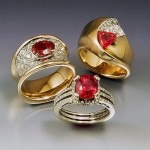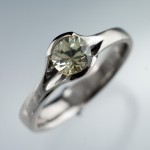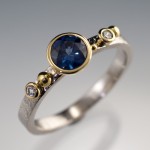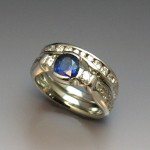
14k gold rings, set with diamonds and fair trade Nyala rubies from Malawi, sourced by Columbia Gem House. Photo courtesy Trios Studio, Lake Oswego, OR.
The story of colored gems is not always a pretty one. At the mining and manufacturing end there is environmental degradation, child labor, death from silicosis, low wages, dangerous working conditions. For wholesalers, retailers, and consumers, an uncontrolled supply chain can allow treated, adulterated, imitation, and synthetic materials to masquerade as naturals, creating distrust among buyers and lawsuits against suppliers.
These situations are well known to consumers—especially the millions of socially and environmentally aware “Millennials” born in the final decades of the 20th century–through television documentaries and the Internet. Projected to have the greatest impact on consumerism since the post-war Baby Boomers, this demographic wants the same global and community awareness from those who provide their products. They already pay a premium for responsibly sourced products, such as coffee, chocolate, and beauty products.

18kw gold ring set with light green, untreated, Montana sapphire, approx. 0.60ct. Designers often focus on gems produced by domestic artisanal gem miners, such as Montana sapphires. Photo courtesy Nodeform.
As a result of the above–a desire to do “the right thing” for the environment and gem workers; to ensure the quality of the supply chain; to protect consumers against deception and themselves against lawsuits and tarnished reputations; and the demands of a rising market–a slowly a growing segment of the jewelry industry is turning toward fair trade or responsible sourcing in gold, diamonds and colored gemstones.

Special events at retailers such as Trios Studio, in Lake Oswego, Oregon, help raise funds for community projects, such as this well to provide fresh water to Ntcheu, Malawi where the Chimwadzulu mine is located. Photo courtesy Columbia Gem House.
Essentially, fair trade advocates fair wages for and treatment of miners and cutters; enforcement of health and safety standards; protecting and/or reducing the impact of mining the environment; controlling the integrity of the supply chain to prevent fraud and deceptive practices; and giving back to the communities in which mining and cutting take place in the form of help with improved education, health care delivery and sanitation, infrastructure, and job training.
It’s a tall order. However, members of the jewelry industry are doing what they can in a variety of ways.

Fair trade suppliers emphasize mining practices that have a lower impact on the environment, often working with artisanal gem miners. Photo courtesy Nineteen48/Crown Gems.
Columbia Gem House, in Vancouver, Washington, one of the first to promote responsibly sourced gemstones, has established partnerships with the Chimwadzulu Nyala ruby mine and the surrounding community in Malawi, as well as a top-quality cutting house in China in order to guarantee the integrity of the stones they sell. They pay above average wages and participate in projects that help raise the quality of services in the community.

Companies that focus on fair trade help ensure mine employees have safe working environments. Training develops skilled workers that ensures product quality. Photo courtesy Columbia Gem House.
Crown Gems, a British-Sri Lankan joint venture, provides a transparent gemstone channel from their own mines in Sri Lanka or those they trust to use mining practices with less detrimental effect on the environment. They partner with small, independent cutters and ensure they work in safe, well-maintained environments.
UK-based Rubyfair.com partners directly with miners in Tanzania to provide a tight supply chain of tanzanite, spinel, and untreated ruby and sapphire cut in Tanzania and imported into the UK.

18kw/y gold ring, set with fair trade Malawi sapphire, approx 0.60ct, and 0.04ct T.W. Harmony recycled diamonds from Hoover & Strong. Photo courtesy Nodeform.
Refiner Hoover & Strong, in Richmond, Virginia, reduces their impact io the environment by offering products made only from recycled gold. In addition, Hoover & Strong has introduced its Harmony line of recycled or previously owned diamonds.
Not only wholesalers focus on responsible sourcing. Retailer Ethical Jewellery Australia Pty Ltd, offers only Australian and Canadian diamonds. They buy colored gemstones only from domestic gem miners and cutters, or suppliers who have strict, transparent guidelines for sourcing and processing.
Although owners of the US-based Trios Studio, in Oregon, educate their clients year round about fair trade gemstones, a special, in-store event once a spotlights the stones. A percentage of the proceeds of the event goes to support community projects in Ntcheu, Malawi, where the Chimwadzulu mine is located.

Custom-made, 14k white gold wedding set, set with diamonds and fair trade blue sapphire from Chimwadzulu mine, Malawi. Photo courtesy Trios Studio.
For some designers, the concept of fair trade goes extends beyond the mine into the laboratory. Younger buyers, interested in responsibly sourced gemstones, are much more open than their parents to buying lab-created gems, such as Moissonite, sapphire, emerald, and ruby. In fact, designers, such as Konstanze, of Nodeform, and Tamara McFarland, of McFarland Designs, in addition emphasizing fair trade natural gemstones, give their customers the option of purchasing lab-created gems even for that time-hallowed purchase, the engagement ring. That fact alone should pique gemstone suppliers’ interest in providing consumers with responsibly sourced, fair trade gems.
